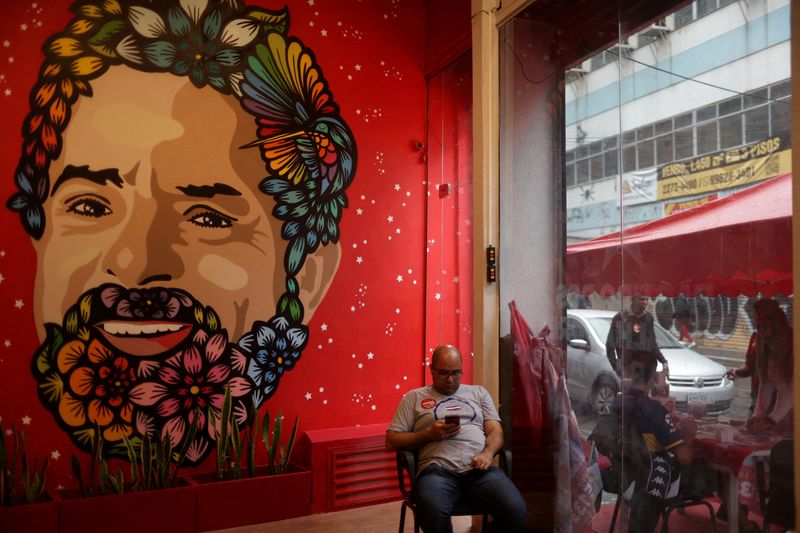Analysis-Turnout key for Lula to clinch Brazil election in first round
2022.09.30 06:25
[ad_1]
2/2

© Reuters. A man sits next to a graffiti of former Brazil’s President and candidate for presidential election Luiz Inacio Lula da Silva at his campaign headquarters in Rio de Janeiro, Brazil September 28, 2022. REUTERS/Pilar Olivares
2/2
By Anthony Boadle
BRASILIA (Reuters) – Brazilian presidential front-runner Luiz Inacio Lula da Silva has gained steam in the final stretch of the campaign, opinion polls show, and could defeat incumbent Jair Bolsonaro in the first round on Sunday – if his base shows up to vote in full force.
Still, rising voter abstention, especially among less affluent Brazilians who lean toward leftist Lula, could mean the election goes to a second round. If no one among the 11 candidates gets more than 50% of votes, excluding blank and spoiled ballots, the two front-runners – almost certainly Lula and Bolsonaro – would go to an Oct. 30 run-off vote.
“Lula has a real chance of winning in the first round, but abstention will be a big challenge for his Workers Party and its allies,” said Andre Cesar of political consultancy Hold Assessoria Legislativa. He warned that Lula’s lead in opinion polls could leave some supporters thinking their vote is unneeded.
Although voting is obligatory for most adults in Brazil, plenty incur a minor fine for shirking the duty – especially poorer voters who face transportation challenges or other demands on election days. The share of absent voters has risen in recent years to 23% in 2020, when the pandemic may have played a role.
“If turnout is good in all groups, Lula wins outright,” said analyst Rafael Cortez at Tendencias consultancy.
Not all forecasters are so sure.
Eurasia Group estimated last week a 20-25% chance of Lula winning the election in the first round, with the odds rising as supporters for candidates polling in low single digits switch to Lula and Bolsonaro.
Although traditional in-person polling shops Datafolha and IPEC have shown Lula within the margin of error for a first-round victory, surveys via telephone run by FSB, Ipespe and Ideia show the race going to a second round, with Lula prevailing.
Those polling discrepancies may hinge on the accessibility of poorer Lula supporters, who are relatively easier to reach in person and harder to catch on the phone. The lack of a recent census has also made it tougher for pollsters to weight their samples.
However, most agree a high turnout would be good news for Lula.
PoderData, the polling division of news website Poder360, found that among Brazilians thinking of skipping the vote, 54% were supporters of Lula, compared to just 22% for Bolsonaro.
“Any reduction in voter turnout will hurt Lula, because low-income voters are more likely to stay out of the election, and that could ruin his outright victory scenario,” said Cortez.
That said, Cortez flagged that Lula enters the final stretch of the election with voter support apparently on par with that enjoyed in the 1990s by former President Fernando Henrique Cardoso, who won two terms outright in first-round voting.
[ad_2]
Source link








